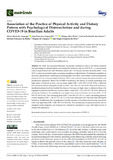Mostrar el registro sencillo del ítem
Association of the practice of physical activity and dietary pattern with psychological distress before and during Covid-19 in Brazilian adults
| dc.creator | Camargo, Edina Maria de | es_ES |
| dc.creator | López Gil, José Francisco | es_ES |
| dc.creator | Piola, Thiago Silva | es_ES |
| dc.creator | Pechnicki dos Santos, Leticia | es_ES |
| dc.creator | Fernando de Borba, Edilson | es_ES |
| dc.creator | Campos, Wagner de | es_ES |
| dc.creator | Gregorio da Silva, Sergio | es_ES |
| dc.date.accessioned | 2023-07-05T08:17:31Z | |
| dc.date.available | 2023-07-05T08:17:31Z | |
| dc.date.issued | 2023 | |
| dc.identifier.citation | De Camargo, E. M., López-Gil, J. F., Piola, T. S., Pechnicki Dos Santos, L., De Borba, E. F., De Campos, W., & Gregorio Da Silva, S. (2023). Association of the practice of physical activity and dietary pattern with psychological distress before and during covid-19 in brazilian adults. Nutrients, 15(8), 1926. https://doi.org/10.3390/nu15081926 | en |
| dc.identifier.issn | 2072-6643 | |
| dc.identifier.uri | https://hdl.handle.net/2454/45762 | |
| dc.description.abstract | To verify the association between the practice of physical activity and dietary patterns and psychological distress before and during the lockdown due to COVID-19, a cross-sectional study was performed with 2000 Brazilians (mean [M] = 35.78 years; standard deviation [SD] = 11.20; 59.6% women) recruited through convenience sampling via digital media. Participants completed an electronic questionnaire containing sociodemographic and clinical information, nutritional patterns, physical activity, and psychological distress. Data were analyzed using descriptive statistics and multinomial regression. Before the COVID-19 lockdown, the chance of women presenting very high stress, in relation to men, was six times higher (OR = 6.32; 95% CI 4.20–9.51), a behavior that remained similar during the lockdown (OR = 6.63; 95% CI 4.40–10.00). Before the lockdown, insufficient physical activity doubled the chance of having very high stress in relation to those who engaged in physical activities six to seven times a week (OR = 2.11; 95% CI 1.10–4.02). However, during the lockdown, this probability was higher, from twice to 10 times the chance (OR = 10.19; 95% CI 4.85–21.41). Not exercising alone (OR = 2.18; 95% CI 1.52–3.11) and a decreasing physical activity frequency (OR = 2.28; 95% CI 1.40–3.71) were also associated with very high stress during the lockdown. Additionally, the consumption of smaller amounts of food showed an inverse association with very high stress (OR = 0.28; 95% CI 0.18–0.43). The maintenance of physical activity and an adequate eating frequency are measures that should be considered to cope with higher levels of anxiety and depression. | en |
| dc.format.mimetype | application/pdf | en |
| dc.language.iso | eng | en |
| dc.publisher | MDPI | en |
| dc.relation.ispartof | Nutrients 2023, 15, 1926 | en |
| dc.rights | © 2023 by the authors. This article is an open access article distributed under the terms and conditions of the Creative Commons Attribution (CC BY) license. | en |
| dc.rights.uri | http://creativecommons.org/licenses/by/4.0/ | |
| dc.subject | Anxiety | en |
| dc.subject | COVID-19 | en |
| dc.subject | Depression | en |
| dc.subject | Dietary pattern | en |
| dc.subject | Physical activity | en |
| dc.title | Association of the practice of physical activity and dietary pattern with psychological distress before and during Covid-19 in Brazilian adults | en |
| dc.type | Artículo / Artikulua | es |
| dc.type | info:eu-repo/semantics/article | en |
| dc.date.updated | 2023-07-05T08:06:33Z | |
| dc.contributor.department | Ciencias de la Salud | es_ES |
| dc.contributor.department | Osasun Zientziak | eu |
| dc.rights.accessRights | Acceso abierto / Sarbide irekia | es |
| dc.rights.accessRights | info:eu-repo/semantics/openAccess | en |
| dc.identifier.doi | 10.3390/nu15081926 | |
| dc.relation.publisherversion | https://doi.org/10.3390/nu15081926 | |
| dc.type.version | Versión publicada / Argitaratu den bertsioa | es |
| dc.type.version | info:eu-repo/semantics/publishedVersion | en |
| dc.contributor.funder | Universidad Pública de Navarra / Nafarroako Unibertsitate Publikoa, UPNA1225/2022 | es |



